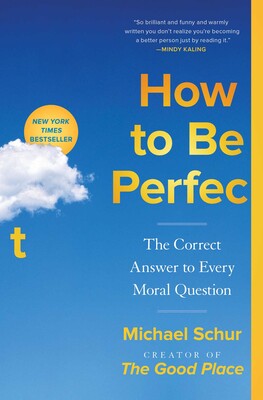Michael Schur – How to Be Perfect Audiobook
Michael Schur – How to Be Perfect Audiobook

text
In a world filled with complex choices, pitfalls, and bad advice, most people consider themselves “good,” but determining what is truly “good” or “bad” can be challenging. Fortunately, numerous intelligent philosophers have spent centuries pondering this conundrum and offering guidance. With wit and insight, the book “How to Be Perfect” delves into concepts such as deontology, utilitarianism, existentialism, ubuntu, and more. Its aim is to equip readers with knowledge that not only impresses others at social gatherings but also helps them become better individuals.
Exploring Ethical Questions: The author, Michael Schur, begins by tackling straightforward ethical questions, like whether one should punch a friend in the face for no reason (the answer is a resounding “no”). As the book progresses, it delves into more complex moral issues that we all encounter in our lives. Some of these questions include: Can we appreciate great art if it was created by morally reprehensible individuals? How much money should we donate to charity? Why should we bother being good when there seem to be no consequences for being bad? By addressing these topics, the book aims to provide readers with guidance on how to act in every conceivable situation, maximizing the amount of moral good they can generate. While achieving perfection may be a lofty goal, the book offers fresh, funny, and inspiring wisdom on the everyday challenges we face.
The Genius of Michael Schur: Michael Schur’s creative genius is evident in his notable works such as “Parks and Recreation” and “The Good Place,” not to mention his contributions to “The Office” and other shows. His ability to craft engaging and thought-provoking stories has solidified his place in the Awesome Hall of Fame, and his expertise shines through in this book.
An Invitation for The Good Place Fans: Fans of “The Good Place” will find this book particularly enjoyable. However, one downside is that it might inspire readers to aspire to be better individuals, which requires effort—an aspect that some may find challenging due to various commitments and obligations.
Philosophy Made Accessible: For those who have aspirations of discussing philosophers like Wittgenstein, Nietzsche, and Aristotle but find the idea of reading their works daunting, this book offers a solution. It condenses 2,500 years of philosophical thought into short, concise chapters that are both accessible and engaging. Examples of chapter titles include “Do I Have to Return My Shopping Cart to the Shopping Cart Rack Thingy? I Mean… It’s All the Way Over There” and “This Sandwich Is Morally Problematic. But It’s Also Delicious. Can I Still Eat It?” This approach allows readers to engage with profound philosophical ideas without feeling overwhelmed.
The Complexity of Being Good: Schur acknowledges that being good is challenging. In fact, he admits that 80% of the time when confronted with morally problematic situations, there is no perfect solution. However, by approaching ethical dilemmas with thoughtful analysis, he suggests that 20% of the time, one may realize that an alternative course of action is slightly better and choose accordingly. While there are no definitive rules to follow, there is value in engaging in moral reasoning and critical thinking.
Conclusion: “How to Be Perfect” provides readers with a humorous and enlightening exploration of ethics and moral dilemmas. It encourages individuals to reflect on their actions and make thoughtful choices to maximize moral goodness. While perfection may be elusive, the book offers valuable insights to help navigate the complexities of everyday life and strive for personal growth.